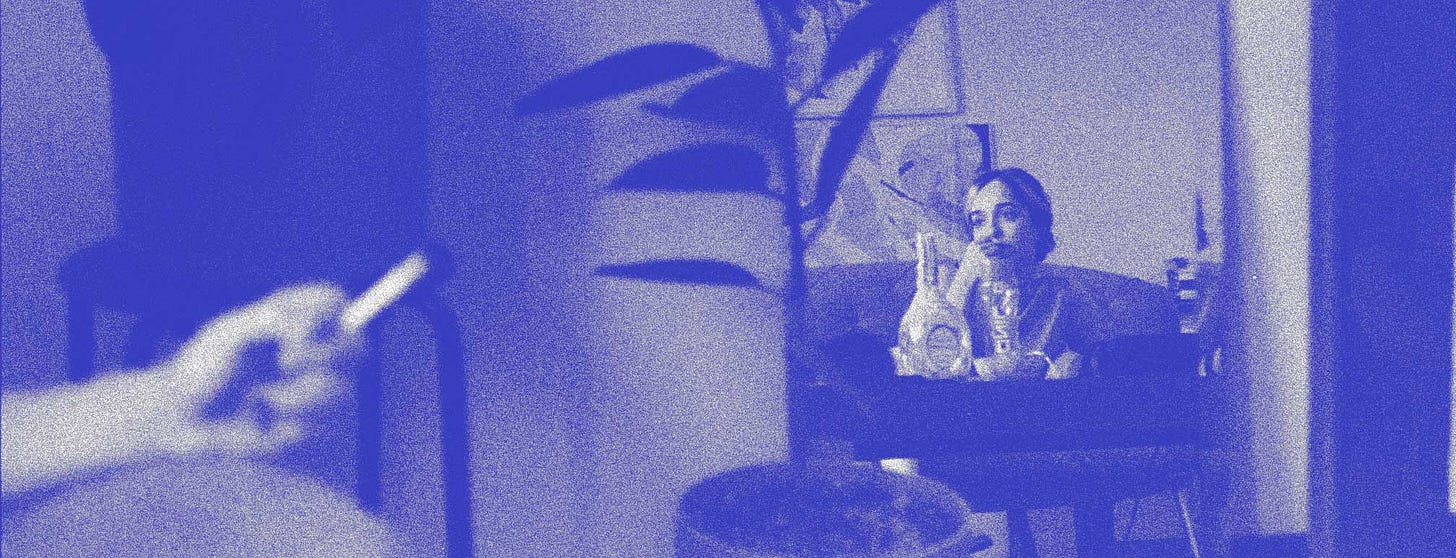This is Week 2 of our 6-week Read Your Color deep dive series. Every weekend for the next 6 weeks, we're exploring each reader type in detail—helping you understand not just what you read, but how and why you read. Last week we covered the Yellow Reader. Next week: The Green Reader.
I remember the first time I read Augustine's Confessions. I was twenty-eight, sitting in my living room surrounded by my two-year-old’s toys and reminding myself I needed to take the batteries out of that train set that would not shut up. I opened the book on my couch early in the morning — completely unprepared for what I was about to encounter. Here was a mind wrestling with questions I'd barely learned to ask: What is goodness? How do we change? Who is God? What does it mean to truly know yourself?
Augustine wasn't offering easy answers or comfortable platitudes. He was thinking rigorously, honestly, and sometimes painfully about the deepest questions of human existence. By the time I finished, I felt like I'd been given new intellectual equipment, a more sophisticated way of examining my own life and the world around me.
This is what the best books do. They don't just tell us stories or make us feel things, but they teach us how to think about what really matters.
Consider how Remarque's All Quiet on the Western Front forces us to grapple with the nature of patriotism, duty, and what we owe our fellow humans when institutions demand the unthinkable. Or how Edith Wharton's The Age of Innocence dissects the subtle tyrannies of social conformity, making us question what we sacrifice for acceptance and what we gain from rebellion. Dostoevsky's Crime and Punishment doesn't just tell the story of a murder. He investigates the very foundations of moral reasoning, conscience, and redemption.
These books share something crucial with Augustine's ancient meditation: they trust readers to engage with complexity. They assume you want to think, not just consume. They believe that wrestling with difficult questions—even when those questions don't have clean answers—is how we become more fully human.
Do you find yourself drawn to books like this? Do you approach reading as an opportunity to engage with the hardest, most uncomfortable questions of existence? When you encounter a profound idea, do you feel compelled to test it, examine its implications, see how it reshapes everything else you thought you knew?
If so, you're what’s call a Blue Reader.
You Are a Blue Reader
Blue Readers are driven by a fundamental impulse: to ask the hardest, most uncomfortable questions of life. You're not content with surface answers or easy explanations. You want to understand how things really work, why people really behave the way they do, what really matters when everything else falls away.
Read Your Color is a new reader typing system designed to help you escape the trap of genre and discover books that you'll love and that will make you grow as readers. Instead of being boxed in by romance or fantasy labels, you can understand your deeper reading motivations and venture into new territory with confidence.
This drive toward difficult questions shapes everything about how you read. You're drawn to books that examine moral complexity, philosophical paradoxes, psychological depth. You prefer authors who resist simple answers, who allow you to handle ambiguity and intellectual challenge.
Your reading pace reflects your priorities. While others race through plot points, you linger over passages that crystallize complex ideas. You'll spend twenty minutes on a single page if it contains something worth thinking about. Speed reading feels like intellectual vandalism.
You have a complicated relationship with most contemporary fiction. So much of it feels intellectually thin, gesturing toward profundity without earning it. You crave novels that grapple seriously with moral complexity. Some of your favorite books might include Gilead, East of Eden, Atonement, Things Fall Apart, Crime and Punishment, or A Portrait of the Artist as a Young Man. What draws you to these isn't just beautiful prose—it's the way they use story to illuminate fundamental questions about consciousness, memory, responsibility, and what it means to be human.
You experience what others might find frustrating: intellectual restlessness after finishing profound books. Your mind keeps working on the ideas long after you've closed the cover. You might spend weeks processing a book's central questions, testing them against your own experience.
Here's what sets you apart: you believe that reading should change how you think, which should change how you live. Books aren't just entertainment or escape—they're tools for intellectual and moral development.
But there's a problem.
The Blue Reader Trap
Your intellectual hunger has made you vulnerable to a sophisticated form of readers atrophy.
You've developed intellectual arrogance instead of intellectual humility. Real knowledge humbles us. The more you truly understand about existence, human nature, and the complexity of moral questions, the more you should appreciate how much you don't know, how difficult these questions really are, and how much grace other people deserve as they wrestle with the same puzzles. But instead of developing this humility, many Blue Readers become intellectual snobs, dismissive of anyone who doesn't share their taste for complexity.
You've been seduced by pseudo-intellectual rambling that says nothing worthwhile. There's a whole category of books that sound profound but are actually just beautifully written nonsense—rambling prose that gestures toward depth without ever landing on anything concrete or useful. These books exist primarily to make readers feel sophisticated rather than to actually develop their thinking. You've learned to mistake verbose complexity for genuine insight.
You've confused difficulty with profundity. Some Blue Readers fall into the trap of believing that if a book is hard to understand, it must be important. But genuine intellectual depth isn't about obscurity—it's about grappling seriously with real questions. The most profound insights are often elegantly simple once you understand them.
Most contemporary fiction simply doesn't give your intellect enough to work with. You need moral ambiguity, philosophical complexity, ideas that resist easy resolution. But much of what passes for serious literature today prioritizes emotional impact over intellectual rigor. Certain formulaic narratives in contemporary genre fiction (romance, self-help, thriller, fantasy) have become so dominant that publishers have forgotten readers like you exist. Of course, some genre fiction—especially in romance, sci-fi, and fantasy—can be profoundly philosophical. But much of what dominates bestseller lists is built more for emotional immediacy than intellectual challenge.
You've developed a guilt complex around reading for pure intellectual pleasure. You've internalized the idea that books should be emotionally moving or socially relevant to be worthwhile. This has made you suspicious of philosophy, science, or history books that might actually feed your mind more thoroughly than another beautifully written novel about family dysfunction.
Here's the beautiful irony: the best version of a Blue Reader is someone who has read so widely, encountered so many different perspectives and experiences, that they've developed profound grace for human complexity. When you've truly grappled with the hardest questions through literature, you understand how difficult life really is for everyone. You offer the benefit of the doubt because you've seen how many different ways there are to be human, how many valid responses there are to suffering, how much wisdom can emerge from unexpected places.
Real intellectual sophistication makes you more generous, not less. More curious about people who think differently, not more dismissive. More aware of your own limitations, not more convinced of your superiority.
A Tool, Not an Identity
Before we dive deeper, let me be clear about something important. This isn't another personality test designed to limit you. These color categories are tools for understanding what you're craving in this season of your reading life, not permanent identities to constrain you.
You might be solidly Blue right now but find yourself drawn to Yellow books during periods of emotional upheaval, or Red books when you need energy and momentum. The point isn't to box you in—it's to help you navigate the overwhelming volume of published books with more intention.
There are hundreds of thousands of books published every year. This system simply helps you cut through that noise to find books that will actually satisfy your intellectual appetite rather than just promise to feed it.
Think of your Blue Reader tendencies as a compass, not a cage.
The Intellectual Practice Approach
Here's what you need to remember: your instinct to treat reading as intellectual practice is exactly right. Your belief that books should challenge your thinking and expand your understanding—this captures reading at its highest purpose.
But intellectual practices require good material. If you're going to bring serious attention to your reading, you deserve books that reward that seriousness. Books that trust your intelligence rather than underestimate it. Books that offer genuine complexity rather than the simulation of depth.
Your contemplative approach to reading isn't something to apologize for. When you choose books that honor your intellectual hunger, you're participating in a tradition that stretches back to those ancient philosophers who believed rigorous thinking could transform both individuals and societies.
What We're Covering Below (Subscribers Only)
🧠 The Blue Reader's Intellectual Fingerprint
The specific mental patterns that drive your reading choices—plus the telltale signs you're intellectually hungry that go far beyond "I like smart books"
📚 How Literary Publishers Manufacture Pseudo-Depth
The exact techniques used to create books that sound profound but lack intellectual substance—and why literary prizes often reward beautiful emptiness
🤔 Your Secret Reading Rituals (That Others Find Excessive)
From rereading complex passages to needing silence for deep thinking—all the contemplative habits that make you a more rigorous reader
📖 The Blue Reader's Intellectual Detox Protocol
My step-by-step system for becoming a better reader
🎯 25 Books That Respect Your Intelligence
Curated recommendations organized by the type of intellectual engagement you're seeking—books that deliver genuine complexity and philosophical depth
🌈 Cross-Training Your Mind
How to venture into other reading colors without sacrificing intellectual rigor—your bridge books and expansion strategies
Ready to transform how books serve your intellectual development? The real insights start below.
Keep reading with a 7-day free trial
Subscribe to Read Your Color to keep reading this post and get 7 days of free access to the full post archives.







